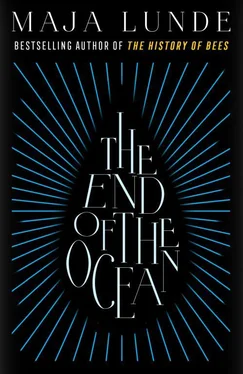Then the door to the barracks opened and it was our turn.
The floor was clean; it was the first thing I noticed. A hard, wooden floor, without a speck of dust. There were several cables coiling across it. And it was cooler in here. A fan on the wall droned loudly.
A woman who was half hidden behind the monitor of a desktop computer smiled.
“Have a seat, both of you.”
She pointed at two chairs in front of the desk.
I quickly explained our case: that the family had been split up when we left the south, but that we had agreed to meet here.
“It was my wife’s suggestion,” I said. “She wanted us to come here.”
The woman started typing on the computer. She asked for the names and birth dates of both Anna and August, asked what they looked like.
“Look like?”
“Do they have any special characteristics?”
“… No… Anna has brown hair. She’s quite short.” It suddenly sounded like I thought there was something wrong with her. “I mean… relatively short. Five foot two, I think. And pretty,” I hastened to add.
The woman smiled.
“She has brown hair that gets blonder in the summertime. Brown eyes,” I said.
“And the child?”
“He’s… an ordinary baby. He has four teeth and still doesn’t have much hair. Perhaps he has a few more teeth now, actually. He was cranky the last few days. I believe his gums were itchy.”
What more should I say? That he had a tummy I liked to bury my face in? That he laughed loudly and shrilly? That he howled like a foghorn when he was hungry?
“When did you last see them?” the lady asked.
“When we left,” I said. “The day we left Argelès, July 15th.”
“The time of day?”
“Midday. Lunchtime.”
Lou had stopped looking at me now. Instead she pulled her legs up beneath her, leaning her head towards her knees.
“What happened?” the woman said.
“What happened?” I repeated.
“Yes?”
Suddenly I didn’t like her prying.
“What has happened to many people,” I said. “We had to flee, were some of the last people to leave the city. And we got separated.”
“Was that it?”
“Yes.”
“And you haven’t heard from her since?”
“How could I? The network is down. Telephones don’t work. But I’ve tried. Otherwise I wouldn’t be sitting here now!”
I drew a breath. I had to calm down, couldn’t start screaming. Be positive. Show that I’m a good guy.
Besides, I liked the woman. In her fifties, a narrow face. She looked tired, working hard for others all day, that kind of tiredness.
“We agreed,” I said as clearly and calmly as I could. “We agreed to come here. That was our plan.”
She looked at the computer again and wrote something else.
“Unfortunately I can’t find them registered here,” she said slowly. “They’re not here. And neither have they been here.”
I looked at Lou—had she heard anything? Maybe not. She was sitting with her forehead against her knees, making it impossible to see her face.
“Can you check one more time?” I said to the woman.
“There’s no need,” she said flatly.
“Yes, there is,” I said.
“David, listen—”
“What’s your name?” I said.
“… Jeanette.”
“OK, Jeanette. You probably have a family of your own. Imagine if we were talking about your people?”
“My people?”
“Your family. Your loved ones.”
“I have lost somebody too,” she said.
She had lost somebody too.
Of course she had lost somebody as well. Somebody she searched for, somebody she would maybe never see again.
“I’m sorry,” I said. “What I mean is that you are the one with access to the records.” I pointed at the computers. “Isn’t that what you do? Find people?”
Find people. It sounded childish. I was a child for her, no doubt, a child with a child. I straightened up. Ruffled Lou’s hair, tried to look paternal.
“We have to find Anna. She’s her mother,” I said. “And her brother,” I hastened to add. She mustn’t think that I’d forgotten about August.
“I’m sorry, but you’ve been separated for twenty-four days,” she said. “Anything could have happened.”
“Twenty-four days isn’t that long,” I said.
“Maybe they’ve ended up in another camp,” she said, and now there was something comforting in her voice.
“Yes,” I said quickly. “That must be what happened.”
“I can put in a missing persons notice,” Jeanette said.
She smiled again, really trying to be pleasant. And I responded, just as pleasantly: thank you, that was kind of you. I wanted to show her that I could do this too. I sat stiffly, holding my arms tightly against my body. I hid my elbows from her, hid the rings of sweat on my T-shirt. I looked at Lou again.
I still couldn’t see her face. She was sitting just as stiffly as I was, with her face pressed against her knees.
Afterwards she had marks from her knees on her forehead where the fabric of her trousers had created a faint grid pattern on her smooth skin.
I didn’t take her hand. I wanted to run. Scream. But I forced myself to walk calmly.
The crickets. They stay the course. They can take this.
I am a cricket.
Ishould fix something that needs fixing. On a boat there is always something to be taken care of, to be oiled, coiled, sealed, cleaned or secured. On a boat you never have time off. Or I should pay a visit to the hotel, say hello to my half-brothers. I should, I’ve hardly seen them since they took over the hotel. But all I do is sit here in the saloon drinking tea, unable to move. I have been home, here in Ringfjorden, for a full twenty-four hours now, and all I do is sit here listening.
The rat-a-tat-tat of the helicopters—the sound has been there since this morning, back and forth over the mountain, from the glacier to the defunct fish-landing station and back. The station has been reopened for this new business: there the ice is chopped and packaged before being shipped out.
The rat-a-tat-tat sound rises and falls, no longer a sound, something more physical, something lodged inside me. The vibrations shake the water of the fjord, the deck, and send shivers down my spine.
Maybe people in the village complain about this, maybe they write to the local newspaper, whining letters to the editor. Because they must have something to say, they must have some kind of opinion? I haven’t spoken to anyone yet, haven’t asked, but now I get up and go to the store.
I nod to the woman at the cash register, who doesn’t appear to recognize me. And I don’t remember her face either. I am one of the few people who left the village, one of the few who chose another life. Signe Hauger, the journalist, the author, the professional activist—people here have perhaps not read anything by me, but they have certainly heard about me. At least they’ve heard the gossip, even though that was many years ago, when I chained myself to a barricade in protest and was put in jail.
But she doesn’t recognize me, no, because she nods back indifferently. I should ask her what she thinks about Blåfonna, about the helicopters. Most people like sharing their personal opinions. Perhaps I can engage her in some idle chatter; it’s a strange expression idle chatter , as if small talk required no effort whatsoever. I don’t have the strength for this kind of social banter, whether I know the other person or not. But today I’m going to ask about something specific, so that’s different. All the same, I can’t bring myself to walk straight up to her; that would seem strange, unnatural. I decide instead to wait until I pay for my groceries.
Читать дальше










